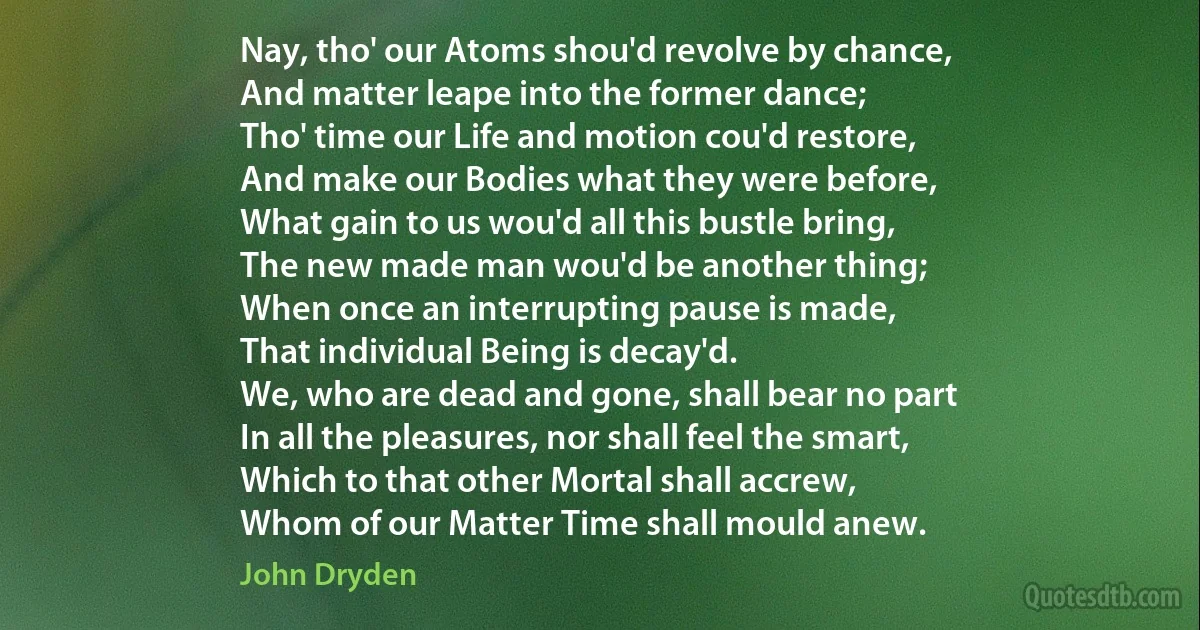Nay Quotes - page 5
And Festus said with a loud voice, Paul, thou art beside thyself.”
Acts 26:24.
And so say all the world, the men who know not God, of all that are of Paul's religion: of every one who is so a follower of him as he was of Christ. It is true, there is a sort of religion, nay, and it is called Christianity too, which may be practised without any such Imputation, which is generally allowed to be consistent with common sense, -that is, a religion of form, a round of outward duties, performed in a decent, regular manner. You may add orthodoxy thereto, a system of right opinions, yea, and some quantity of heathen morality; and yet not many will pronounce, that "much religion hath made you mad.” But if you aim at the religion of the heart, if you talk of "righteousness, and peace, and joy in the Holy Ghost,” then it will not be long before your sentence is passed, "Thou art beside thyself.

John Wesley
Nay, if there's room for poets in the world
A little overgrown, (I think there is)
Their sole work is to represent the age,
Their age, not Charlemagne's, - this live, throbbing age,
That brawls, cheats, maddens, calculates, aspires,
And spends more passion, more heroic heat,
Betwixt the mirrors of its drawing-rooms,
Than Roland with his knights, at Roncesvalles.

Elizabeth Barrett Browning
The real issue underlying these controversies appears to have been a challenge to his philosophy of music; nay, that of the Trinity. Balamuralikrishna has long held that Carnatic music today is an entity outside the strictly religious domain. He remarked once that those who believed that concert singing denigrated the essence of Carnatic music should confine their singing to puja rooms.

M. Balamuralikrishna
No true work since the world began was ever wasted; no true life since the world began has ever failed. Oh, understand those two perverted words "failure" and "success." and measure them by the eternal, not by the earthly standard. When after thirty obscure, toilsome, unrecorded years in the shop of the village carpenter, one came forth to be preeminently the man of sorrows, to wander from city to city in homeless labors, and to expire in lonely agony upon the shameful cross - was that a failure? Nay, my brethren. it was the death of Him who lived that we might follow His footsteps, it was the life, it was the death of the Son of God.

Frederic William Farrar
It is too true, however disgraceful it may be to human nature, that nations in general will make war whenever they have a prospect of getting anything by it; nay, absolute monarchs will often make war when their nations are to get nothing by it, but for the purposes and objects merely personal, such as thirst for military glory, revenge for personal affronts, ambition, or private compacts to aggrandize or support their particular families or partisans. These and a variety of other motives, which affect only the mind of the sovereign, often lead him to engage in wars not sanctified by justice or the voice and interests of his people.

John Jay
There is no servant except that there exists a white spot upon his heart. So when he commits a sin, a black spot arises into that white spot. Then when he repents, this black spot moves away. But if he continues on committing sins, the blackness of this spot increases till such time that it overwhelms and overrides the whiteness. When the whiteness is all covered over (by the blackness), the owner of it (the heart) does never at all return towards beneficence and goodness. And This is what God means when he says: "Nay! rather, what they used to do has become like a rust upon their hearts."

Muhammad al-Baqir
They do not ill, being lords of ours, to slay
Me; nay, they could not spare: but thee to slay,
To spill thy strong young life for truth to me,
In all men's eyes would mark them monstrous: thou
Must live, and serve my slayers, and serving them
Sustain my memory by the proof - if God
Shall give thee grace to prove it - that thy name,
Thy father's name and mine, in true men's ears
Rings truth, and means not treason.

Algernon Charles Swinburne
In opposition to the aristocratic valuation (good = noble, beautiful, happy, favoured by the gods) the slave morality then is this: The wretched alone are the good; those who suffer and are heavy laden, the sick and the ugly, they are the only pious ones. On the other hand, you, ye noble and rich, are to all eternity the evil, the cruel, the insatiate, the ungodly, and after death the damned. Whereas noble morality was the manifestation of great self-esteem, a continual yea-saying, slave morality is a continual Nay, a Thou shall not, a negation. To the noble valuation good bad (bad = worthless) corresponds the antithesis of slave morality, good evil. And who are the evil in this morality of the oppressed? Precisely the same who in the other morality were the good.

Georg Brandes
Nietzsche proposes the following brilliant hypothesis: The bad conscience is the deep-seated morbid condition that declared itself in man under the stress of the most radical change he has ever experienced when he found himself imprisoned in perpetuity within a society which was in- violable. All the strong and savage instincts such as adventurousness, rashness, cunning, rapacity, lust of power, which till then had not only been honoured, but actually encouraged, were suddenly put down as dangerous, and by degrees branded as immoral and criminal. Creatures adapted to a roving life of war and adventure suddenly saw all their instincts classed as worthless, nay, as forbidden. An immense despondency, a dejection without parallel, then took possession of them. And all these instincts that were not allowed an outward vent, turned inwards on the man himself feelings of enmity, cruelty, ... violence, persecution, destruction and thus the bad conscience originated.

Georg Brandes
When [Diogenes] observed how other men were harassed throughout their whole lives, ever plotting against one another, ever encompassed by a thousand ills and never able to enjoy a moment's rest, nay, not even during the great festivals nor when they proclaimed a truce; and when he beheld that they did or suffered all this simply in order to keep themselves alive, and that their greatest fear was lest their so-called necessities should fail them, and how, furthermore, they planned and strove to leave great riches to their children, he marvelled that he too did not do the like, but was the only independent man in the world.

Dio Chrysostom
Each nation has its own pet sins to which it is merciful, and also sins which it treats as most abhorrent. In America, we are peculiarly sensitive about big money contributions for which the donors expect any reward. In England, where in some ways the standard is higher than here, such contributions are accepted as a matter of course, nay, as one of the methods by which wealthy men obtain peerages. It would be well-nigh an impossibility for a man to secure a seat in the United States Senate by mere campaign contributions, in the way that seats in the British House of Lords have often been secured without any scandal being caused thereby.

Theodore Roosevelt
Constitutional statutes ... which embody the settled public opinion of the people who enacted them and whom they are to govern - can always be enforced. But if they embody only the sentiments of a bare majority, pronounced under the influence of a temporary excitement, they will, if strenuously opposed, always fail of their object; nay, they are likely to injure the cause they are framed to advance.

Rutherford B. Hayes



